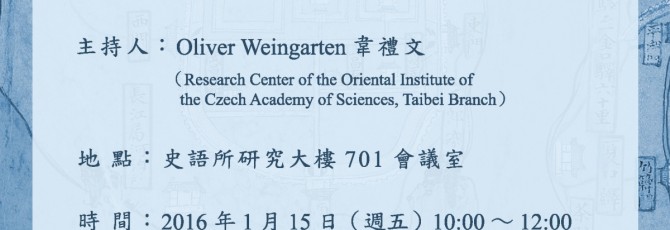
Talk: Chinese Philosophy’s Hybrid Identity
15/01/2016 Tana Dluhosova Events, News, TaiwanAbstract Historically, Chinese thought has been most profoundly influenced by two external intellectual traditions: disciplinary-based Western thought and Indian Buddhist thought. Western thought began to be introduced into China by the Jesuits about four centuries ago; disciplinary-based Western thought began to be introduced from Japan...
Talk: Uyghur Discourse of Nation and National Interest
26/12/2015 Tana Dluhosova Events, News, TaiwanAbstract The talk explores the emergence of national consciousness and nationalist ideology of Uyghurs in Xinjiang from c. 1900-1949. Drawing from texts written by modern Uyghur intellectuals, politicians and propagandists throughout this period, the talk identifies diverse types of Uyghur discourse on the nation and national interest, and traces...
TALK: Oliver Weingarten – Some Structural Factors Facilitating Textual Memory in Ancient Writing
22/12/2015 Tana Dluhosova Events, News, TaiwanTime: 9:30–11:00 Venue: Chinese Department of Tsinghua University, Hsin-chu Abstract: 此次演講將討論先秦至西漢文獻中的一些與古典學學者 Alessandro Vatri 在古希臘文獻裡所指出的有益於記憶的文本結構與文筆特徵 (“mnemonic facilitators”)...

Opening of the Research Center in Taiwan
03/12/2015 orient Events, News, TaiwanOn December 3, 2015, the Research Center of the Oriental Institute (Czech Academy of Sciences) at Academia Sinica in Taiwan (RCT) has been established. Prof. Wang Fan-sen, the vice-president of the Academia Sinica, Prof. Huang Chin-shing, the director of the Institute of History and Philology, and Dr. Beránek, the director of the Oriental...
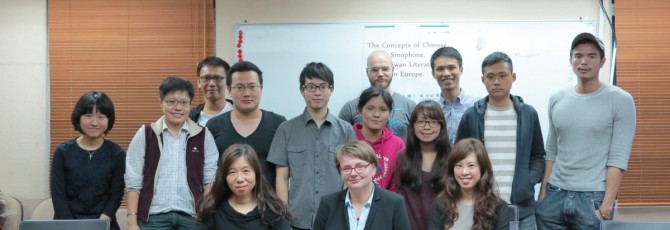
Talk: The Concepts of Chinese, Sinophone, and Taiwan Literatures in Europe
25/11/2015 Tana Dluhosova Events, News, TaiwanAbstract: Presentation focuses on the notions of Chinese literature, Taiwan literature, and Sinophone literature in the European academic context. It gives a brief summary of the concept of Sinophone literature. Rather than to start out from a predetermined set of definitions in order to explore how these three concepts are negotiated on a...
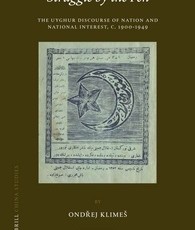
Roundtable and Book Launch: Xinjiang and the Chinese Dream of a Harmounious Society
12/10/2015 Tana Dluhosova Events, NewsThe round table first presents a new book by the Oriental Institute’s Research Fellow Ondřej Klimeš Struggle by the Pen: The Uyghur Discourse of Nation and National Interest, c. 1900-1949 (Brill, 2015), which explores the emergence of national consciousness and nationalist ideology of Uyghurs in Xinjiang from c. 1900-1949. Drawing from texts...
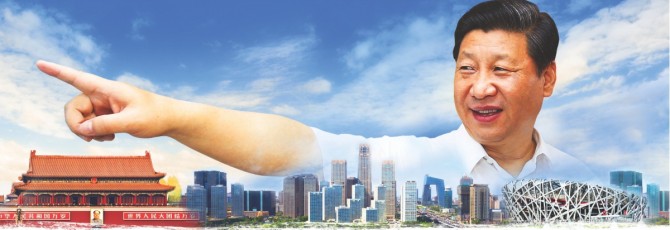
Workshop: Ideology, Propaganda and Political Discourse in Xi Jinping´s China
13/09/2015 Tana Dluhosova Events, NewsAbstract Past years have brought resurgence of scholarly interest in the rule of the Chinese Communist Party, and having thus reevaluated the previously valid framework of “the coming collapse of the Chinese party-state” in observing contemporary politics in the People’s Republic of China. There is a general consensus that the PRC continues...
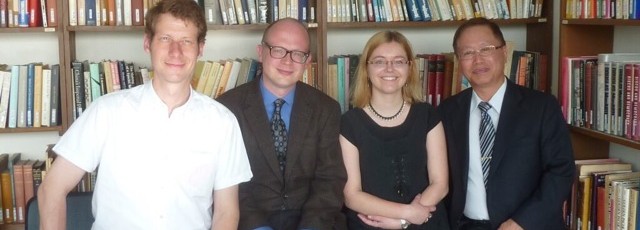
Lecture: Charles Sanft (University of Tennessee)
11/05/2015 orient Events, News1) Communication and Cooperation in Early Imperial China The talk draws from received history, the results of archaeological excavation, and current secondary scholarship to argue for the importance of non-coercive government under the early empire. It argues that despite its reputation as a harsh and totalitarian regime, the Qin dynasty...
Search
Recent Posts
Categories
Archives
- January 2021 (1)
- November 2020 (2)
- April 2020 (1)
- December 2019 (1)
- March 2019 (1)
- February 2019 (1)
- September 2018 (2)
- August 2018 (1)
- May 2018 (1)
- February 2018 (1)
- December 2017 (3)
- November 2017 (2)
- October 2017 (1)
- June 2017 (1)
- May 2017 (4)
- November 2016 (3)
- October 2016 (1)
- June 2016 (3)
- April 2016 (4)
- March 2016 (2)
- February 2016 (3)
- January 2016 (1)
- December 2015 (5)
- November 2015 (1)
- October 2015 (1)
- September 2015 (1)
- May 2015 (1)
